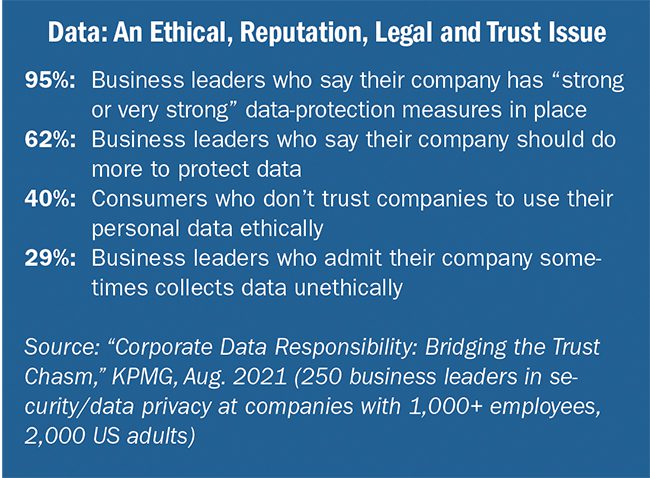
The phrase “in our social media-centric society there’s not much privacy when data is involved” and its serious implications are key issues for our profession and our time.
PRSA recognizes each September as Ethics Month. This magnification of the ethical practice of PR is an important reminder that we are on the front lines delivering information and data and responding to how they are received.
How data is used and who is using it, where it is shared and for what purposes, among myriad other questions, raise concerns of critical importance for communication pros about accuracy, integrity and informed decision-making.
Data Privacy: So Misunderstood
While widely discussed, data privacy is not always understood and is a concept often viewed with suspicion.
For example, a recent Ipsos poll found 7 in 10 Americans say that controlling who can access their online information has become more of a challenge. And just 3 in 10 say they are very familiar with the concept of data privacy.
The data that companies collect usually fits into four categories, according to Business News Daily: personal data, engagement data, behavioral data and attitudinal data. That’s a lot of specific information floating around.
Unfortunately, it’s not surprising that 40% of consumers don’t trust companies to use their data ethically. And 13% don’t trust their employers to do so, a KPMG report says.
Further complicating matters, while data privacy is an international issue, there is no worldwide consensus about data management, control or regulation.
For example, the European Union’s General Data Protection Regulation (GDPR), which went into effect in 2018, requires organizations to safeguard personal data and uphold the privacy rights of anyone in EU territory. (The UK implemented its version following Brexit.)
The U.S., however, lacks a national privacy law, although that may change shortly. If enacted, the American Data and Privacy Protection Act would “provide consumers with foundational privacy rights, create strong oversight mechanisms and establish meaningful enforcement.”
A Regulatory Pastiche
The current uncoordinated system of regulations requires communicators not only be aware of laws where they live and work, but also have a thorough understanding of the patchwork quality of the national scene.
So, with all this in mind, a question: What are your organization’s data privacy policies, procedures and practices?
If you don’t have these, don’t know or are not thinking about creating them, you’re behind and need to start catching up.
In that light, some suggested steps, priorities and actions:
There’s no such thing as ‘I know enough.’ As we see daily, more and more people are waking up to the dangers of their data being misused, whether through personal experience, the plethora of stories about companies and their misguided actions and policies, or both. We need to not only keep up but stay ahead of the information curve. And remember to anticipate and prepare for ethical challenges that may, and are likely to, arise.
Get ahead of the questions. It may not have happened, but it is inevitable that reporters and consumers will contact you about how your organization is using, selling and/or sharing data. As mentioned above, it is essential that communicators know the who, what, when, where and how so they are not caught off guard when these inquiries come. In addition, this preparedness will help them spot issues before they arise and suggest alternative strategies that might avert crises.
Ethics, clarity. As is true of everything we do, our role as leaders, counselors and change agents must be constantly viewed through an ethical lens, with PRSA’s Code of Ethics as an essential guidepost. For example, a lack of transparency can lead to heightened mistrust about how data might be mishandled. Does your website clearly state data policies? Can a consumer easily opt out of data sharing? When creating content and messages, keep clarity top of mind. This will help mitigate the skepticism that already exists among your constituencies.
Data privacy affects literally everyone, everywhere. As technology is increasingly embedded in our personal and professional lives, it is imperative that we practice, provide and ensure honesty, credibility and yes, the human touch.

Dr. Felicia Blow, APR, is chair, PRSA/Associate VP, Hampton University
